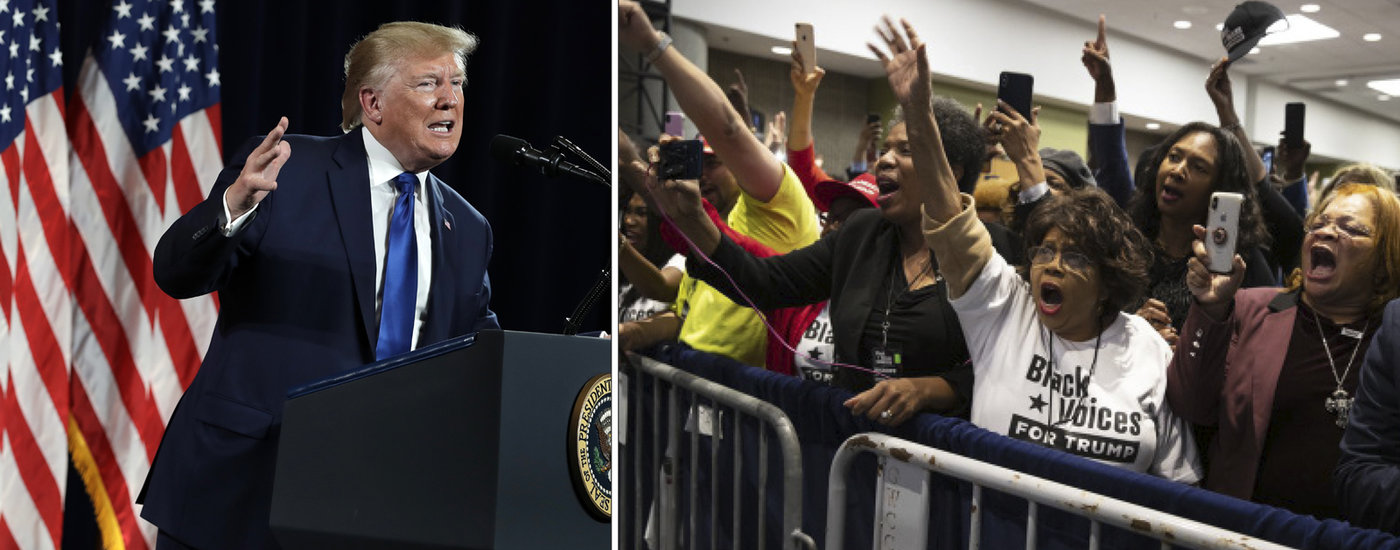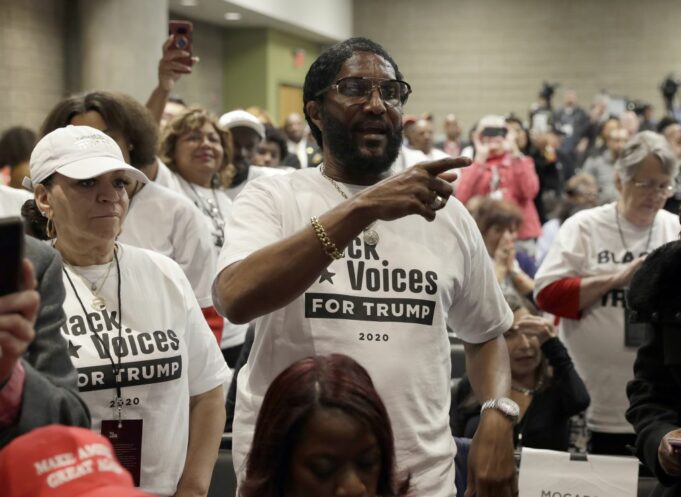The Republican Party and its champion are hurtling toward November presidential elections and the countdown is underway.
For a majority of Black people, the party remains at best an anomaly and in general is seen as an opponent of Black people and Black interests. Yet, the small group of Blacks inside the party, with its Aug. 24-27 national convention, are still trying to hit the proper tones and the proper policy to pull Blacks into the GOP.
They have a long road ahead. Even longtime Black Republican and former Secretary of State Colin Powell has abandoned the party and is supporting Democrat Joe Biden’s presidential aspirations.
Black Voices for Trump says Democrats take Blacks for granted, more focus should be paid to the GOP platform—and it’s time to chart a different political course with wider political definitions.
“The word ‘conservative’ has become culturally ingrained in the Black community to mean racist. Our challenge is how to overcome that perception,” K. Carl Smith told The Final Call. Mr. Smith is the president and founder of Frederick Douglass Republicans and creator of the Frederick Douglass Republican Engagement Strategy.
Its telling that in the 21st century, Black Republicans have to tie themselves to a Black abolitionist from the 1800s, who also is apparently one of Donald Trump’s favorite Black leaders.
“The Republican Party needs to do a better job appealing to Black folks. The Republicans need to win the propaganda battle of being labeled racist and party member Black folk as Uncle Toms,” admitted Mr. Smith.
“Those who embrace conservatism are not racist,” he said. “Vote your pocketbook and values is the needed message, and we will be fine. The Republican Party is bad, but the Democratic Party is worse. I am not an apologist for the Republican Party. I am more than a conservative I’m a Fredrick Douglas Republican. We have to advocate for the poor.”
President Donald Trump does indeed have a Black agenda Texas State Representative James White told The Final Call. “In 2016 he called it ‘The New Deal for Black America’ where he asked Black America to take a chance on him, and lord knows Black people need a new deal,” said State Representative White.
Mr. White rattled off what he called the president’s wins for the Black community:
• Gains in Black unemployment before the pandemic with 1.2 million more Black Americans have found work since Mr. Trump was elected.
• Blacks below poverty fell from 21.8 percent in 2016 to 21.2 percent in 2017.
• President Trump welcomed to the Oval Office the heads of historically Black colleges and universities. He also launched a White House office to assist HBCUs.
• President Trump created opportunity zones under the Tax Cuts and Jobs Act. Nearly 9,000 communities across all 50 states are targets for new investments and jobs.
• School choice is backed by the president who says zip codes should not predetermine the quality of education for Black children.
• Since President Trump’s First Step Act, a criminal justice reform initiative, became the law over a year ago, more than 3,000 Americans have been released from prison, and 90 percent of those who have had their sentences decreased are Black Americans.
Dr. Linda Tarver, a member of the National Federation of Republican Women, urged Blacks to read the Republican Party platform. “The party rolled over the 2016 platform because of the virus, and it’s a powerful platform,” she maintained.
“It emphasizes law enforcement, a strong military, border security, the establishment of an America that is the most powerful … country on the face of the earth, with limited government, separation of powers, federalism, and the rights of the people must be preserved, uncompromised for future generations. We believe political freedom and economic freedom are indivisible,” said Ms. Taylor.

While she makes that argument, Mr. Trump has shown little respect for the separation of powers, little respect for the press, ridiculed street protests, called Black Lives Matter a terrorist group, openly embraced White supremacists, urged police officers not to be so gentle with suspects and derided Black athletes following Colin Kaepernick’s call for kneeling for justice “sons of b—-hes” who are unpatriotic and should be fired.
He has also attacked Democratic Party vice presidential choice Kamala Harris, the first Black woman and Asian American on a major party ticket. Some supporters, like radio host Rush Limbaugh, have derisively referred to the Democratic ticket as “Joe and the Hoe.”
Among the president’s latest escapades is a direct appeal to White voters, saying he was rescuing them from federal housing policy that would lead to disastrous Black invasions of the suburbs.
He has blasted Democratic controlled cities and Black politicians as crime filled and ineffective, vowing to bring in the feds if local police can’t stop crime.
Covid-19 has disproportionately infected and killed Black people and President Trump’s denial of reality and self-serving politics have brought the country to a disastrous point, say Black analysts.
And, Black voters are seen as key to the 2020 presidential outcome. “In November, the number of Black voters who turn out in the crucial swing states of Pennsylvania, Michigan and Wisconsin is likely to be the deciding factor in the election. That means Black voters, 12 percent of the national electorate, are set to pick our next president,” argued writer Juan Williams in a New York Times opinion piece.
Earlier this year, a Washington Post/Ipsos poll found just 13 percent of Blacks felt the GOP represented their interests well. Mr. Trump would like to capture more than 8 percent of the Black vote or stifle the Black vote to stay in office. The same poll found 92 percent of Black registered voters backed Mr. Biden over President Trump.
Like others, Dr. Tarver tries to bypass the divisive, racist antics, words and tweets of the commander-in-chief who a majority of Blacks see as the enemy.
“People need to read the platforms and get rid of personalities,” she said.
Black analysts, however, counter that what the president says and tweets matters, setting the tone for the country and federal policy, including a lax view on things like police accountability.
The president and his party have used race to appeal to White fears, grievances and to win in modern politics, leaving Blacks grasping for historical straws to justify backing the GOP.
“In its infancy, the Republican Party formed to oppose the extension of slavery,” said Angela Stanton King, who is running as a Republican for the seat held by the late civil rights leader and congressman John Lewis in Atlanta. “And the first 23 African Americans in Congress did belong to the Republican Party, due to the GOP’s support of voting rights and the Democratic Party’s embrace of White supremacy,” she pointed out.
“It’s time for us to get back to our roots. I’m a Frederick Douglas conservative. It is important to wake our people up and let Black people know that the Democratic Party does not truly represent us,” she said.
For Black Republicans, the challenge isn’t just negative images but a party with a history of voter suppression.
As a means to address images, the Republican National Committee has opened more than a dozen new Trump Victory Committee field offices within the heart of historically Democratic and predominantly Black neighborhoods. The hope is to attract 15 percent of the Black vote.
During the last presidential election, President Trump received 8 percent.
Since 1968, no Republican presidential candidate has garnered more than 13 percent of the Black vote. The latest polls had the president having the backing of 10 percent of Black voters.
“The notion that he is trying to suppress the Black vote is a lot of fear and conjecture,” State Representative White said. “Why would the President want to suppress the Black vote when he has a very robust Black Voices for Trump campaign and the field office initiative? Why would he do that when he is on the streets battling for Black votes? Why would he want to spend resources, political capital with policies that are trying to suppress what he is trying to do?”
“Only the Black community sits at one table where decisions are made,” said Attorney Elbert Guillory, a former Republican member of the Louisiana State Senate.
“You will not find Black people at the table where decisions are being made that affect our lives other than the Democratic Party, and that is a problem,” he told The Final Call.
“When the Democrats are out of power we suffer, when they are in power, we suffer even more. They take us for granted. We are their lapdogs, we need to be at every table where decisions are made. I am proud to sit at the Republican table where I can protect my community, make sure my community is in a position of power. We need to do more of that,” he said.
Mr. Smith pointed to rising Black stars running for office in the GOP, such as Kim Klacik in Baltimore, Kathy Barnett in Pennsylvania, Lacy Johnson in Minnesota, and Casper Stockham in Colorado. Tim Scott, of South Carolina, is the sole Black Republican in the Senate.
State Representative White took shots at the Democratic Party as “the party of Jim Crow, the party of slavery and division, the party that beat John Lewis, Vice President Biden’s party who is the purveyor of labeling our children super predators and advocating for a criminal justice system that is about lock up and not lift up. It’s Democratic subterfuge, with a claim of inclusion, smoke, and mirrors to distract folk. They have a 180-year legacy of absolute viciousness and preying on Black folk, and it’s the historical party of the KKK.”
His problem is the Republicans’ history of opposition to 1960s civil rights laws and affirmative action, overt anti-Black appeals in national elections, passing ID laws and other measures that restrict Black voting, refusing to hold abusive police officers accountable and coddling right wing militias, gun groups and White supremacists.
Dr. Alverta King, a niece of Dr. Martin Luther King, argues Blacks should vote based on moral imperatives.
“So, we must simply vote what’s right. So, if the principal is thou shall not kill, then that means not to murder from the womb to the tomb. So we should not vote any platform that would murder innocent people,” she said.
“The things that should appeal to Black folk regarding the party are its economic agenda, criminal justice reform, and education through school choice.”













